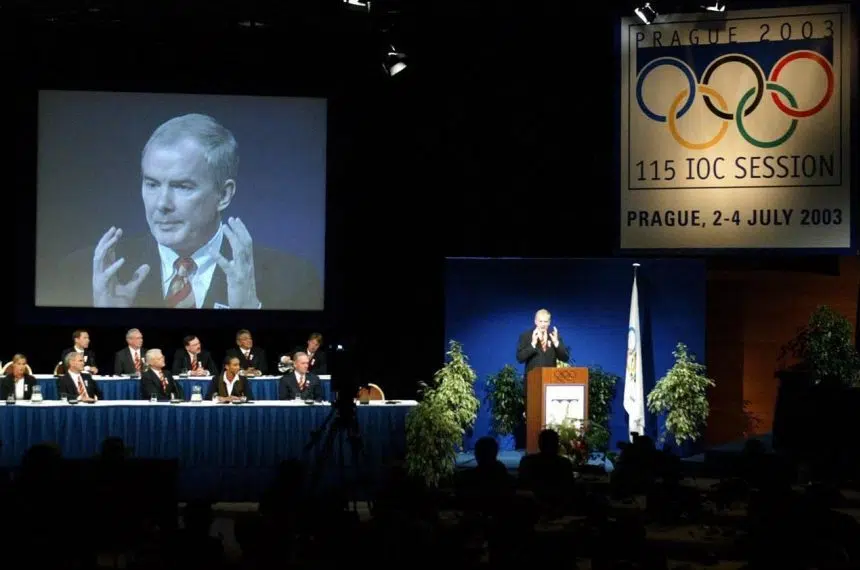CALGARY — The success of a Calgary bid for the 2026 Olympic and Paralympic Games will depend on its leader.
With the deadline to submit bids to the International Olympic Committee just nine months away, a champion for a 2026 bid has yet to appear.
City council hasn’t decided if Calgary will bid or not, but the city recently put out a call via its website to people interested in becoming the chief executive officer and chair of a bid corporation.
Candidates were asked to be ready to take on those roles by May 30. The CEO, the primary strategist, and chair, the head of the bid corporation’s board of directors, would be the faces of a 2026 bid.
They will be asking Calgarians, the country and the world to emotionally invest in their vision of another Winter Olympics in the city after the ’88 Games.
They will also be asked by nervous taxpayers how much it will all cost. An initial estimate by the Calgary Bid Exploration Committee was $4.6 billion with games revenues covering almost half.
A bid alone is $30 million with the city, province and federal governments willing to split the cost.
Getting governments, corporations, the public and eventually the IOC to buy in on Calgary 2026 hinges on the charisma, creativity and trustworthiness of the CEO and chair.
The number of Canadians with experience leading successful bids is small.
John Furlong and the late Jack Poole quarterbacked the bid for the 2010 Games in Vancouver and Whistler, B.C.
Bob Niven was president of the 1988 bid and, along with Frank King and Bill Warren, successfully brought those games to Calgary.
While they pursued Winter Games in different eras, their job description for the person or people taking on the mammoth tasks of organizing, selling and winning an Olympic bid hasn’t changed: a trusted visionary who is a captivating storyteller and networker with the stamina of an ultramarathoner. They must love their city, Canada and the Olympics.
“We had to get out and tell the Calgary story at every opportunity,” Niven said in an interview.
“The success of the project will ultimately depend on who the champion is, the kind of team they’re able to put together and the type of story they’re able to tell,” Furlong added.
Poole, who died of cancer in 2009, was a real-estate titan in Vancouver.
A man who came from humble beginnings in Saskatchewan and recovered from bankruptcy to create a business empire was seen as someone who could get big jobs done.
Furlong, who was interviewed for the job Poole eventually got, came on board to work with Poole and later headed Vancouver’s organizing committee after the bid was won.
“Jack had done some impossible things. He knew a thing or two about adversity,” Furlong said. “He knew a thing or two about falling down and getting back up, so there was great faith that no matter what happens along the way, he would bring the organization to an inspired outcome. All of which turned out to be true.
“There was a real belief that come hell or high water he would be a phenomenal guy to present this project to the country and to the world and people trusted him.”
Niven and King were engineers in the oil industry and Warren a lawyer 40 years ago when the need for a fieldhouse in Calgary morphed into a bid for the Olympic Games.
Niven and company volunteered their time pursuing a bid while continuing to work in their professional fields.
As private citizens who sold $5 pins to raise money for a bid, they had the goodwill of Calgary residents in large part because there was little risk to the public purse in the bid stage.
“I think there was a lot of trust and confidence because of what we were doing on behalf of them at no cost to them,” Niven said. “We were making personal sacrifices.
“Someone along the way asked us by what authority did we go ahead and bid for the games? We said ‘We’re just citizens trying to improve the lot of the citizens at large and athletes in this country.’
“Everybody knew what we were trying to do, which was develop facilities and sports programs that would not only benefit Calgary athletes, but all of those across Canada.”
As for who will be the face or faces of a Calgary 2026 bid, the city is chockablock with former athletes who went on to successful professional careers and remain vocal supporters of Olympic sport — Mark Tewksbury, Ken Read and Catriona Le May Doan to name a few — as well as industry giants in oil and gas, finance, communications and aviation, who have the political connections and business acumen to drive a bid.
But starting with apprehensive city councillors all the way to the IOC, the champion of a 2026 bid ultimately has to inspire faith and confidence that Calgary can host another successful and special Winter Olympics.
“At the end of the day, you’re going to stand on a stage somewhere in the world and they’re going to decide between you and two or three other countries about which one they respect the most, trust the most, like the most and vote,” Furlong said.
Donna Spencer, The Canadian Press







